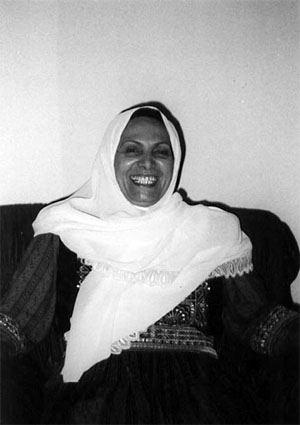
Husniyya Abdel Qader. Boulata Camp, (Nablus), July 1998.
|
 Husniyya Abdel Qader. Boulata Camp, (Nablus), July 1998. |
| Husniyya Abdel Qader, Boulata camp, July 2:
|
|
After Hajji Zeinab, Hussein takes me to record with an ex-prisoner, Husniyya Abdel Qader. She's exceptionally cheerful, and laughs a lot while telling her story. Her high humour impresses me, since prison appears to have damaged her physically -- trouble in her backbone, four steel pins. Not for the first time, I encounter a Palestinian refugee family composed of children who lost their parents at an early age, but who stayed together and brought each other up. This testimony supports an interesting oral history study carried out by the Damen sisters on the effects of the Nakbeh on Palestinian families. They found a weakening of parental authority, as parents struggled to make a living in difficult circumstances, with a compensating strengthening of sibling solidarity. 4
Husniyya speaks softly, and there's a lot of traffic noise from outside. Why didn't I invest in a digital recorder? It would have cut down background interference, and produced better quality recordings. This is, after all, a national archive.
Husniyya Abdel Qader speaks: "My name is Husniyya Da'oud Abdel Qader. My family were forced to leave in 1948. From Teen al-Danda.5 My family suffered from homelessness, and they lived in many villages like the rest of the Palestinian people thrown out of their country. They lived in a village of the Ghor... now called Beit Dajjen. I was born in Beit Dajjen in 1951. I was the 10th child. And after me there were seven. I studied in an UNRWA school in Boulata camp. I lived like every other refugee child in the camp, in spite of all the suffering, and at times in need. My parents both died when I was twelve years old. My father died, and six months later my mother died. We were twelve in this house. The oldest one was sixteen years old. We had brothers from our father who were older than us, who looked after us financially, and spent on us. We were all in school. In 1967 of course we stayed here. My brothers in Kuwait tried to pressure us to leave here and emigrate because we were young and none of us worked. But we refused, even though we were young. My brothers kept on sending money. The oldest of my brothers who was here was in school. Then the older ones finished high school and traveled abroad to continue their studies. All the brothers and sisters who were abroad |
couldn't come back because of the occupation. We were one of those families who were persecuted because one of my brothers was in prison in 1969 when he was 16 years old. They accused him of being in an organization called The Black Hand -- of being the leader..."
Present in the room when I record with Husniyya is her niece, a young woman of student age called Aysha. Her father is from a different village in Palestine, Salemi, so she speaks from a different generational and social background. She was a schoolgirl during the 1st Intifada and has vivid recollections of Israeli incursions, curfews, the difficulty of getting to school through stones and shooting, and of hearing of the death of friends.
Aysha speaks:
"My name is Aysha Omar Kharoub. I'm seventeen years old, from Boulata camp. My father's family are from Salemi. They left a long time ago -- from Salemi of course -- because the Jews attacked them and threw them out of their houses. So they had to leave. Because if they had stayed of course they would have died. So they left, and came here to Nablus and settled in Boulata camp. And...here the Intifada suffering began... I remember -- when they first came I wasn't born -- after that, after I was born, I became aware of them. I was maybe eight years old when they used to come into our house. Once they broke the floor searching. And (I remember) how they used to imprison us in our houses and not let us out. They would impose a curfew and not let us out of the house, and close the schools -- no one could go to school. (I remember) How we used to sneak from one house to another to visit someone. And how they used to prolong the curfew, and food would run out. How people suffered without food because the curfews went on so long. And in school our studies were delayed by the curfews, and we had to make a big effort, we didn't understand the subject properly, we were just trying to finish the syllabus before the end of the year. Going to and coming from school was dangerous because the Jews were there, and there was shooting and stones. So we had to stay at home and not go to school. And many from the camp were martyred..." |
|
4. See Rawan and Dima Damen, Al-Jana (Beirut), special issue on Palestinian Oral History, Summer 2002. 5. I have not yet been able to locate Tin al-Danda on any map of Palestine. |
[Hajii Zeinab Hashem Abdallah] [Umm Muhammad Jamal Ronani] Copyright©2005 |
|